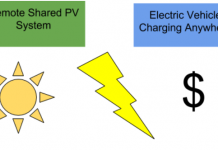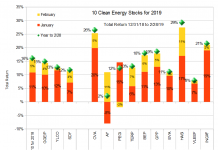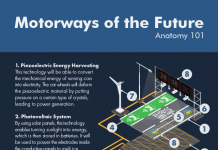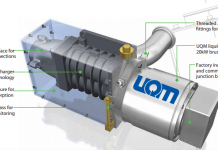CO2 reduction and fuel savings are not the only reasons to own a Plug-in hybrid electric vehicle (PHEV.) There is real value in the ability to plug in to the electric grid which is not captured by price projections.
Tom Konrad, Ph.D., CFA
There will be gas lines.
Alternative energy saw its first flowering during the 1970’s and 1980’s, fueled by the OPEC oil embargo and late oil shocks which followed the peaking of domestic United States oil production. Demand exceeded supply, and domestic price controls meant that the market could not balance supply and demand; instead gas was rationed by the amount of time your were willing to wait in line.
Elitist Hypocrites
I will not be surprised if those days come again, nor, I think, will John Petersen, who has recently been trashing the case for Electric and Plug-in Hybrid Electric Vehicles (EVs and PHEVs, a.k.a. vehicles with plugs) on these pages. A friend of mine saw one of John’s articles and asked if I felt I had been called an "elitist hypocrite" when he said,
PHEVs and EVs are little more than vanity items for elitists who will happily let up to fifteen other Americans waste up to 2,610 gallons of gas per year so that they can save 462 gallons by driving a 100% green car. The hypocrisy is appalling.
I’ve said that my next car will be an EV or PHEV, and I admit to being elitist. The days of happy motoring, if not over already, will be soon. We’re headed for a society where we own fewer cars, and we drive them less. We may even be heading towards a world in which car ownership will be "elitist." Since I hope that my investments in clean energy will allow me to remain in the car-owning elite, I’m comfortable with being elitist.
Incidentally, John told me "I’ll bet dollars to donuts that by 2015 I’ll have both an EV and an ICE [internal combustion engine] in the garage, and the ICE won’t get a whole lot of use." He notes that, by his calculations, this is not the most economic choice, but he expects most people are far more "sensible" than he is.
Unlike John, I don’t expect most people to act in an economically rational manner most of the time, but, as you will see below, I think that the purchase of an EV can be an economically rational choice.
The hypocrisy John referred to comes in believing that subsidies for PHEVs and EVs are better than subsidies for more conventional hybrid electric vehicles, such as the Prius. Again, John and I agree, if the goal is to reduce fuel use and greenhouse emissions, subsidies would be most effective if directed towards high-mileage vehicles of all sorts, with the subsidies proportional to the fuel savings. If the goal is to jump-start the vehicular battery industry, then the subsidies should be proportional to the size of a vehicle’s battery pack, whether or not the car has a plug.
So far, so uncontroversial, at least when we remove John’s rather incendiary language. So why am I bothering to respond?
A Plug for Real Options
A real option, as opposed to the financial sort, such as the cash-covered puts I’m fond of, is the ability to choose something of value in the real world at a later date. An owner of a PHEV has a real option in terms of fuel. For short commutes, the battery pack is sufficient to drive using only electricity, but the owner can choose to use this feature or not. A PHEV will function quite effectively like an ordinary hybrid if it is never plugged in at all.
This is a real option. Another version of this same option is owning both an ICE and EV, as John expects to do, and an option I argued for in 2007, followed by a look at the demand curve for the PHEV-EV trade-off (and more here.)
Today, under most gas price scenarios, the amount the owner of the PHEV paid for the option, (i.e. the premium of the PHEV over an ordinary hybrid) is probably more than the value of the option. John ran through the necessary calculations to show this in his debunking of the PHEV mythology.
But what happens when there are 1970s-style gas lines? When gasoline carries both a monetary cost and an (unknown) price in time, the real option of plugging in your vehicle and never visiting a gas station rises to the value of the time saved and the increased certainty of being able to get where you need to be. The fuel cost savings are just icing on the cake.
Uncertainty
I can’t know for certain that there will be gas lines, or some other form of rationing of petroleum based fuels within the service life of my next vehicle, but I strongly suspect there will be, especially in the world’s top oil importer, the United States. Even if oil production has not yet peaked, net oil exports from oil producing countries probably have. In a world of declining oil supplies, I have little faith in any government resisting the temptation to use non-market measures to keep what oil it has available to itself. Many oil producers will simply stop selling oil to importers at any price, preferring to keep it for their own domestic and geopolitical purposes. So even if the United States government does not yield to the temptation of oil price caps, rationing may have to occur in some form, be it rationing by price, time, or regulation.
There are easily believable scenarios in the not too distant future in which the real option value of a plug could be the difference between a functioning car and an expensive hunk of metal in your garage, be it a conventional hybrid or an ICE. We don’t know if or when we’ll see such a scenario. We also don’t know that it won’t happen.
In an uncertain world, it often makes sense to purchase options, even if they won’t pay off in the "most likely" scenario.
DISCLOSURE: None.
DISCLAIMER: The infor
mation and trades provided here and in the comments are for informational purposes only and are not a solicitation to buy or sell any of these securities. Investing involves substantial risk and you should evaluate your own risk levels before you make any investment. Past results are not an indication of future performance. Please take the time to read the full disclaimer here.









While I don’t worry too much about gas lines, they’re certainly a possibility. More importantly, you obliquely raise the biggest argument in favor of electric drive, which is saved time. In my recent trips to the States I’ve seen that electric drive vehicles often have HOV lane privileges, which could be a monster time saver in some of the more crowded cities. The instant you put the value of the driver’s time into the equation, all of the cost benefit comparisons based on fuel and automotive economics become irrelevant. Since I only live about 5 miles from town and typically drive less than 8,000 miles per year, a small EV may well be in my future if the developers can find a way to resolve the problems of hilly terrain.
Time savings is one of several reasons why people might prefer a plug (although normal hybrids tend to qualify for the HOV lanes in the US.) For EVs, there is also reduced maintenance costs.
Not that any of this makes the case for subsidizing cars with plugs over convential hybrids any stronger. Societal subsidies should be targetted towards societal benefits, such as reduced emissions and fuel use, which do not accrue solely to the vehicle owner.
The plug option, time savings, and reduced maintenance are all private benefits which accrue to the vehicle owner. Hence, they make the purchase of a car with a plug a more economically rational decison, but only weaken the case for subsidies.
Tom:
I think you nailed it on the head.
Like John, I’m not overly worried about gas lines just yet. I think a much more immediate concern with oil is that incremental supply tends to be very expensive to bring into production, and so the marginal cost of oil production will be very high going forward (http://www.altenergystocks.com/archives/2009/08/supercycle_or_not_expensive_oil_is_unavoidable_1.html), even if supply is plentiful for a little while longer.
There is thus a definite option value to a PHEV (which neither EVs not HEVs have), and Brazilians know a lot about this; for years they have been able to choose between sugar cane ethanol or gasoline based on market prices, providing them with the sort of flexibility that most North Americans and Europeans could only ever dream of.
Like any option, the price will grow in value with the price of gasoline (and, theoretically, should grow with price volatility), and I am certainly of the mind that permanently very high gasoline prices are within sight. If you play around with John’s spreadsheet from the Debunking article (http://www.altenergystocks.com/archives/2009/08/debunking_the_phev_mythology.html) you can see the case for a PHEV rising fast with rising gas prices.
I suspect that if you compute past volatility and the life of the option (5 to 8 years in the case of a car), there are at least some vehicle usage and gas price scenarios where purchasing a PHEV looks “rational” even today.
TK. The scenario you outline seems reasonable. I suspect the reality will be much more complex. Certainly there will be people who can and will pay the “option premium” for a PHEV or BEV. However, if either, economic (high prices) or physical rationing occurs during the next decade, I expect the actual response will be varied and dynamic. For example, a number of bio-fuel plants are presently idle due to poor economics. That will change in a heart beat. Additionally, next generation bio-fuels, nearing commercial viability, will also likely spring forth. While ethanol can only replace a limited amount of fuel due to the small number of flex fuel vehicles on the road, virtually any diesel vehicle can operate on bio-diesel. On the demand side, I would expect to see a quick and substantial switch to alternate transport, e.g. motorcycles, scooters, mass transit, even car pooling would re-emerge. In such a crisis, the SPR will also certainly be put to rapid use. Combined with existing domestic production and other actions such as those mentioned, this should carry the nation in “reasonable” form for 6 to 12 months.
While performing this type of thought experiment, it is interesting to explore less obvious impacts. For example, PHEVs and BEV will likely doom, or radically change, convenience stores. Also, with less fuel consumed at higher prices, there will be fewer tanker trucks and probably fewer trucks in general due to less discretionary spending. This will result in even less fuel consumption in a negative feedback loop.
Very likely, if a scenario occurs as you suggest, within days Congress will be under pressure to open all areas to drilling. Of course such action will not have a noticeable impact on the triggering crisis due to the lead times for exploration, development and production. Potentially a much more timely action would be for Congress to alter pollution regulations so that vehicles, probably diesel, can be converted to natural gas without the onerous EPA testing. It might also make sense to convert some existing vehicles to ethanol flex fuel. A much larger and more aggressive “cash for clunkers” program also seems probable. Given the present massive over-capacity of the auto industry, 10%, and possibly much more, of the US auto fleet could be replaced in 2 years. And with a fuel crisis on hand, I would expect far more than a mere 5 mpg difference between the new vehicles and those scrapped.
Certainly such a scenario will be unpleasant and “bumpy” to say the least. However, I too “enjoyed” the oil embargo induced gas lines. And, this time we have numerous options unavailable in the past.
Mike and Charles-
Both very good thoughts… the situation is complex, and I don’t think that it’s really possible to calculate to true value of a PHEV… I only know that it’s higher than it would be if you don’t account for price volatility and market disruption. Since we don’t know what market disruption will look like, we can’t know the value of the PHEV… but your thoughts bring us that much closer.